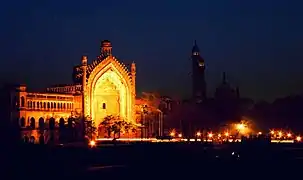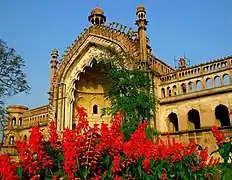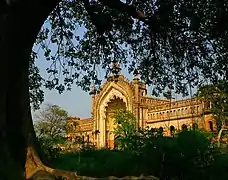Rumi Darwaza
The Rumi Darwaza (Hindi: रूमी दरवाज़ा, Urdu: رومی دروازه, and sometimes known as the Turkish Gate), in Lucknow, Uttar Pradesh, India, is an imposing gateway which was built under the patronage of Nawab Asaf-Ud-Daula in 1784.[1] It is an example of Awadhi architecture.[1] The Rumi Darwaza, which stands sixty feet tall,[2] was modeled (1784) after the Sublime Porte (Bab-iHümayun) in Istanbul.[3]
| Rumi Darwaza रूमी दरवाजा رومی دروازه | |
|---|---|
 Rumi Darwaza in Lucknow | |
| Location | Lucknow, Uttar Pradesh, India |
| Coordinates | 26.860556°N 80.915833°E |
| Height | 18 m (60 ft) |
| Built | 1784 |
| Architectural style(s) | Mughal architecture |
 Location in eastern Uttar Pradesh, India | |
It is adjacent to the Asafi Imambara, Teele Wali Masjid in Lucknow and has become a logo for the city of Lucknow. It used to mark the entrance to Old Lucknow City, but as the City of Nawabs grew and expanded, it was later used as an entrance to a palace which was later demolished by the British insurgents.
In economic policymaking terms, Nawab Asaf-Ud-Daula was quite Keynesian. Every time there was a famine or dip in economic activity, the nawab would employ the poor to construct a new building of some sort in lieu of food or money. Rumi Darwaza is a result of such policy.[4]
Etymology
Rumi means Muslim philosopher and scholar maulana Rumi. It is believed that the gate is called Rumi gate after a 13th-century Muslim Sufi mystic, Jalal ad-Din Muhammad Rumi.[5]
Place
This massive gate is situated between Bara Imambara and Chota Imambara. This place is generally very much busy all day, and during weekends most of the tourists visit. The streets are redeveloped as it was earlier constructed of hard brick roadways.
Gallery







 Rumi Darwaza
Rumi Darwaza Rumi Darwaza at night
Rumi Darwaza at night Rumi Darwaza view from Bara Imambara
Rumi Darwaza view from Bara Imambara
See also
| Wikimedia Commons has media related to Rumi Darwaza. |
References
- "Rumi Darwaza - Lucknow". All India Tour Travel. Retrieved 21 May 2007.
- http://www.lucknow.org.uk/tourist-attractions/rumi-darwaza.html
- "Lucknow". Encyclopædia Britannica. Retrieved 20 May 2008.
- "ExplainSpeaking – economy: Sher Shah Suri, Asaf-ud-Daula and the importance of fiscal multipliers". The Indian Express. 6 September 2020. Retrieved 6 September 2020.
- "Rumi Darwaza, Lucknow". www.nativeplanet.com. Retrieved 22 January 2019.